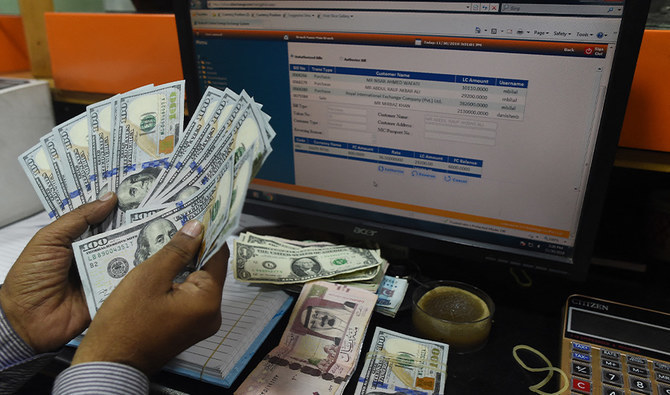ISLAMABAD: Pakistan has received $3.16 billion in remittances from expatriates through the Roshan Digital Account (RDA) service since it was launched in September 2020, the State Bank of Pakistan (SBP) said on Friday.
The RDA service was introduced by the central bank in collaboration with eight commercial banks across the country. The main objective of the service is to facilitate overseas Pakistanis in opening local and foreign exchange currency accounts without visiting the country.
Depositors must provide basic information and documents to the central bank online, allowing them to invest in the country’s stock market, real estate and other sectors.
Dr. Vaqar Ahmed, a senior economist and joint executive director at the Sustainable Development Policy Institute (SDPI) in Islamabad, said inflows through the initiative had helped build up the country’s foreign exchange reserves at a time when the government was facing a ballooning current account deficit with soaring import bills and a depreciating rupee.
“The real test of this initiative will come when the rupee stabilizes against the dollar and the government withdraws tax incentives for real estate investments,” he told Arab News.
Ahmed said the government may withdraw numerous tax incentives being extended to RDA account holders after reaching a deal with the International Monetary Fund for the revival of a $6 billion loan package.
“The real challenge for the government is to make this [RDA] scheme sustainable for a longer period of time to get the maximum benefit out of it,” he said.
Central bank data shows that around 68 percent or $2.15 billion out of the $3.16 billion invested by overseas Pakistanis was in high-return Naya Pakistan Certificates (NPCs) during sixteen months, with $1.19bn invested in the conventional NPCs and $957mn invested in Islamic certificates of the instrument.
A small portion of the $32 million investment has been observed in the equity market. In the month of December 2021 alone, overseas Pakistanis deposited $244mn into the RDA compared to $239mn last month.
A total of 322,463 accounts have been opened so far from around 175 counties across different Pakistani banks.
The government has issued the NPCs in USD, GBP, EURO and PKR at very attractive risk-free rates and in both conventional and Shariah-compliant forms.
On NPC, only a 10 percent withholding tax on profits is applicable. Account holders are not required to submit tax returns while resident Pakistanis who have assets abroad that are declared with the Federal Board of Revenue can also invest in USD/GBP/EURO denominated NPCs, according to the central bank.
As per the state bank’s policy, the funds in these accounts can be fully repatriated without the prior approval of the central bank.
Haroon Sharif, a former economic adviser to the government, said the interest rate being paid to expatriates through the RDA was “very high” at seven percent in dollar terms compared to a mere one or one-and-a-half percent paid to them in the West on savings. Sharif said this was the main reason overseas nationals were pouring money into the RDA.
“At the end of the day, this is a loan to the government but without any strings attached to it, unlike other international lenders,” he told Arab News.
Sharif said the government should encourage overseas nationals to invest in different projects in Pakistan instead of just extending a loan to earn attractive interest rates on their funds.
Dr. Nadia Farooq, a senior economist and research fellow at the University of Georgia, said the inflows from the RDA were helping the country stave off a balance of payments crisis in the wake of a soaring trade deficit and import bill.
“This is the government’s success that it has been able to create a new channel to receive inflows from overseas nationals other than the traditional remittances,” she told Arab News.
She, however, urged the state bank to inform the public about where these funds were being utilized and how interest on them would be paid back to overseas Pakistanis.
“We should introduce structural reforms in our economy to introduce transparency in our investments, loans and spending,” she said, “to get the maximum benefit from schemes like this.”

















